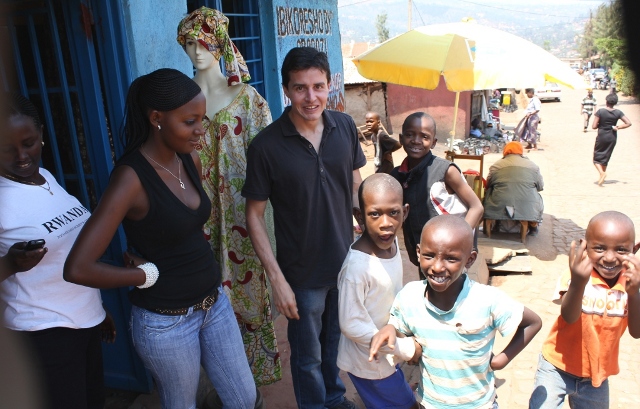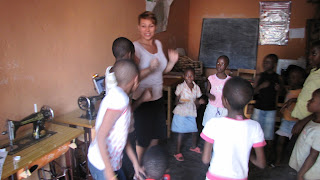What's new in Nyamirambo? New Muzungu is in the neighborhood! I came on last Wednesday, we landed in the mid of the night. It was cold, wet, windy, misty... Muzungu in the mist.
So, the first week is behind me. And what a week! First impressions - it's great! There are no mist, rain, wind or mud anymore, people are nice and friendly, children are so cute, basic words in Kinyarwanda are not that much difficult to learn,
NWC is doing a remarkable job for the community.
Biryogo rules!
I've started giving
English and computer classes. There are 5-8 women in the group, sometimes more. Everyday,
Facebook is the lesson number one (when our Internet provider let us)! We can't start a class without checking our profiles first, laughing at the pictures, sharing and posting things at the walls, sending
"we miss you" messages to Marko (previous volunteer from Croatia)...
Then more serious things are coming; we started with basic Excel features and formulas, so girls are now capable to create simple tables and charts, calculate their incomes, track the number of handicraft produced, their share in percentage, and things like this. They've learned how to import those spreadsheets and charts in the Power Point presentation as well. We are going to take s small exam next week to check what they have remembered. :)
 |
| IT course |
The problem with computer classes (besides very lousy Internet connection) is that we have only one laptop that we can use. It is hard to explain things when everyone can't see the screen and follow you. We could use my laptop too, but it's run on Linux and I'm sure that Ubuntu and OpenOffice would cause more problems and confusions in the group. So, we stick to that one owned by NWC. But we should definitely consider including more computers (and possibly a beamer) when applying for the new funds or approaching possible donors for the equipment.
I've also wrote to the
Hesperian, asking for donation in kind - their printed and CD guides could be a great health information and health education source for the Nymirambo community.
On Sunday we had a regular meeting here in the office. There were 8 members present and they were discussing the current financial situation (the ongoing project will finish by the end of September), plans and activities for the near future, how to increase the visibility of the Center, and so on...

After the meeting we went to
visit NWC's president Maria Aimee and her 8-days-old baby. Girls bought her a tone of things and Jacqueline took all of us there by her car. Nine people squeezed in the car, bumpy dirt road, Muzungu carrying a huge sack on his shoulder through the labyrinth of Nyamirambo's alleys - the fun was there!
We've spent couple of hours at their house, eating, drinking, making jokes. It was funny, although I haven't understood much of it! Nevertheless, congratulations, Maria Aimee! You and (no-name yet) baby both look great! Isabukuru nziza!
Yesterday there was a workshop on sexual and reproductive health. Over 20 women participated and topics covered were family planning, sexual and reproductive health, safe sex and contraception, sexual transmitted diseases.. The Center will continue to give a lectures and organise this kind of workshops for the local community.
 |
| Sexual and Reproductive Health Workshop |
And, at the end, I have to share the incident we had. Few days ago a bunch of kids drop by asking for the empty bottles of water. While Eliab was reaching for the bottles under the table, one of the boys took his phone! We've tried to catch him, looking for them around the neighborhood, asking people and other kids, but there was no use – the phone with all contacts is gone...
 Grants would be used for an uninterrupted continuance of our activities, including administrative expenses necessary to keep the program running. The activities funded by these grants would contribute to socio-economic empowerment of women and poverty reduction, through trainings for income-generating activities, providing women with knowledge, skills and capacities, and achieving even greater impact of Nyamirambo Women’s Center in the local community.
Grants would be used for an uninterrupted continuance of our activities, including administrative expenses necessary to keep the program running. The activities funded by these grants would contribute to socio-economic empowerment of women and poverty reduction, through trainings for income-generating activities, providing women with knowledge, skills and capacities, and achieving even greater impact of Nyamirambo Women’s Center in the local community. 






































